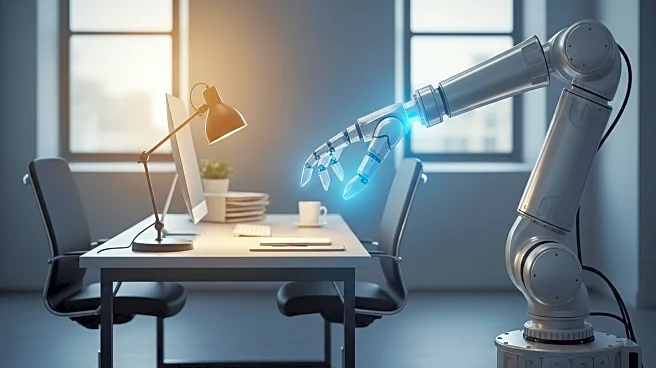What is the story about?
What's Happening?
Recent studies indicate that AI is significantly impacting employment in the U.S., particularly in early-career roles within AI-exposed occupations. A Stanford University study highlights that one in eight such roles have been lost, contributing to a historically high unemployment rate of 5% for recent college graduates in 2025. Companies like Salesforce and CrowdStrike are substituting AI for new staff, leading to a slowdown in hiring rather than direct layoffs. The University of Queensland study further identifies sales, customer service, and entry-level white-collar jobs as vulnerable to automation. Despite these trends, some companies, such as the Commonwealth Bank, deny that AI is directly responsible for job cuts, attributing redundancies to other factors.
Why It's Important?
The integration of AI into the workforce is reshaping the U.S. labor market, with significant implications for young workers and entry-level positions. While AI offers efficiency and cost-saving benefits, it also poses challenges for job security in certain sectors. The trend towards automation necessitates a focus on retraining and upskilling workers to adapt to new technological demands. This shift could lead to a redefinition of job roles and a potential increase in demand for AI-related skills, impacting educational and training institutions. The broader economic implications include potential shifts in consumer spending and economic stability as employment patterns change.
What's Next?
As AI continues to evolve, companies may need to balance automation with workforce development to mitigate job losses. Policymakers and educational institutions might focus on creating programs that support skill development in AI and technology-related fields. Businesses could also explore hybrid models that integrate AI with human oversight to maintain employment levels while leveraging technological advancements. The ongoing dialogue between industry leaders, government, and educational bodies will be crucial in shaping a sustainable future workforce.
Beyond the Headlines
The ethical considerations of AI-driven job displacement are significant, raising questions about corporate responsibility and the social contract between employers and employees. The potential for increased economic inequality and the need for social safety nets may become more pronounced as AI adoption accelerates. Long-term, the cultural perception of work and the value placed on human labor versus machine efficiency could undergo substantial shifts.















